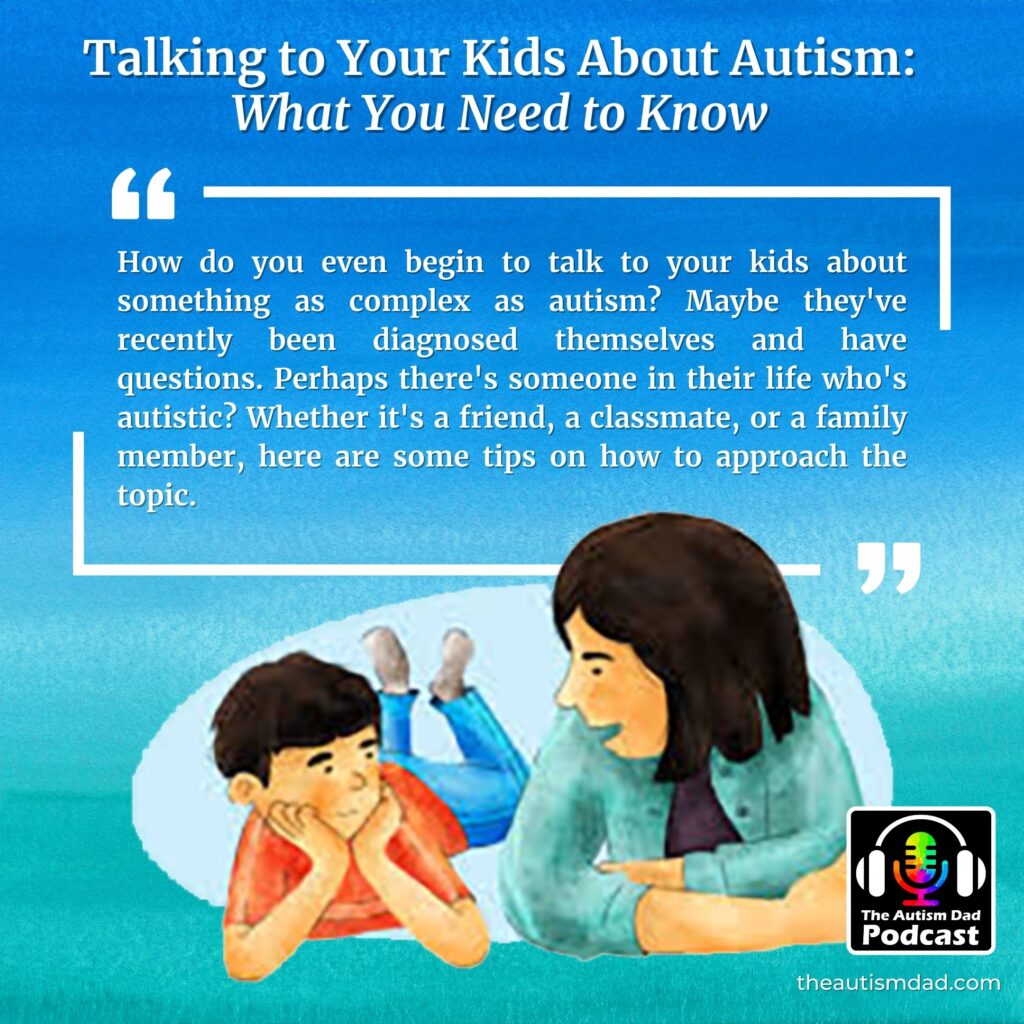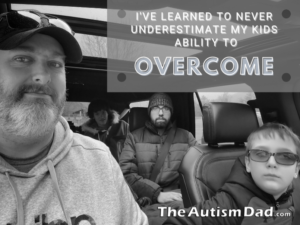If you’re a parent, chances are you’ve already had or will be having difficult conversations with your kids. It’s part of being a parent, and we all go through this, especially if we’re parenting to kid with autism..
What happens when it’s time to talk to your kids about autism? How do you even begin to talk to your kids about something as complex as autism? Maybe they’ve recently been diagnosed themselves and have questions. Perhaps there’s someone in their life who’s autistic? Whether it’s a friend, a classmate, or a family member, here are some tips on how to approach the topic.
Please remember that this is just my opinion based on my experience. Everyone’s situation is different, and there is no one size fits all approach to this. I can’t tell you exactly what to say, but I can share my thoughts on the right approach. I hope this helps.
Keep it simple.
Like any other topic, when explaining autism to your kids, it’s important to use age-appropriate, developmentally friendly language. This means keeping your explanation short, sweet, and matter-of-fact. Things like telling your kids they have superpowers should probably be avoided, at least in my opinion. Most kids on the spectrum tend to be very literal thinkers. I also feel like we should be normalizing autism, not necessarily glamourizing it.
Use the correct terminology and avoid fluff words. Kids need to know that the word autism isn’t a bad word, and it doesn’t have to be scary. Using the correct terminology in a developmentally appropriate way will also help to normalize the conversation as well.
Keep things relaxed, low-key, and positive. Consider having the conversation over ice cream or maybe even while playing a board game. The idea is to provide a positive environment or atmosphere when talking about this because it can make everyone more comfortable and lead to a better outcome.
It’s important to remember that how you present this information will largely determine your child’s takeaway and could leave a lasting impression.
Be open and honest.
When discussing autism with your kids, it’s essential to be open, honest, and developmentally appropriate. Don’t overthink it. I would simply explain how autism is just a different way of thinking. Autistic people are just like everyone else—they just see, hear, and experience the world differently. It’s kind of like how some people are left-handed, and others are right-handed.

Make sure your kids know that being different is okay. The world is full of different people, and they each bring unique things to the world.
Autism is a very confusing human condition because it can be different for every person diagnosed. Some people are more profoundly impacted than others, but that doesn’t change their worth or how amazing they are.
Above all, help your kid to understand that they are not broken. Ensure they know that they are loved, supported, and safe.
Use resources.
You should definitely have a grasp on what autism is before taking on this conversation with your kid. For example, if you’re looking to support your child’s physical development alongside their understanding of autism, you can learn more about pediatric physiotherapy and how it can benefit children on the spectrum. Additionally, learning about autism treatment options is essential, as this can provide insights into therapies that help children thrive. There are many excellent books and websites out there that can help both you and your child learn more about autism. There are tons of blogs like this one out there that can provide insights and guidance based on personal experience. I highly recommend checking out my friend Kate Swenson’s blog called Finding Coopers Voice. Her new book Forever Boy is a must-read. You can also check out my friend Joel Manzer’s website called Autisable. Natashia Kletter has a website and social channel called I want to Tell You Books, and it’s amazing. Both Kate and Joel are autism parents and share their experiences in very different ways. I’ve learned so much from them both, and I know you can as well.
There are also a ton of podcasts out there that are incredibly helpful. You can check out Just Two Dad’s Podcast, Autisable Dad’s Podcast, Autism Radio’s Hope Saves The Day Podcast, and so many more. I’d be remiss if I didn’t also recommend giving mine a listen as well. I’ve embedded a recent episode I recorded on this very topic. Check it out below.
Quick Take Bonus: How to talk to your kids about autism (feat. Rose Hughes)
I also have an autism parenting support forum where you can go to ask questions and learn from other parents and even autistic adults. It’s completely free and a safe space to have conversations with people who get it and want to help. You can find that here.
Speaking of autistic adults, another fantastic resource is the adult autistic community. If you have questions or concerns about how to approach a specific topic, or maybe you just want to understand better what your autistic kids are experiencing, reaching out to adult autistics can help tremendously.
It’s essential to explore and expand your knowledge about autism before taking this topic on with your kids. A quick Google search can leave you drowning in information, feeling overwhelmed, and not knowing where to start. I encourage you to start with some of the resources I linked above. They’re a great place to start. Learning from different perspectives and experiences will not only help you be a better parent but also help you talk to your kids about autism.
Conclusion:
Talking to your kids about autism doesn’t have to be difficult—just keep the conversation straightforward, open, and honest. With a little bit of research, you and your child will be able to learn more about what autism is and why it’s nothing to be scared of.
Thank You V



Thank you, Rob! I’m always looking for information on how to best explain things like this to my mini. I remember the first time she saw someone with a prosthetic leg – mini was 2 and had been watching Daniel Tiger for some time. It really helped her understand how we’re all the same but different, too.